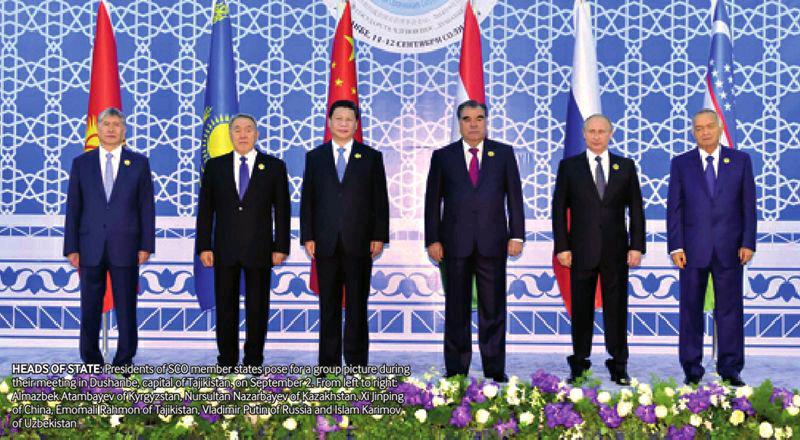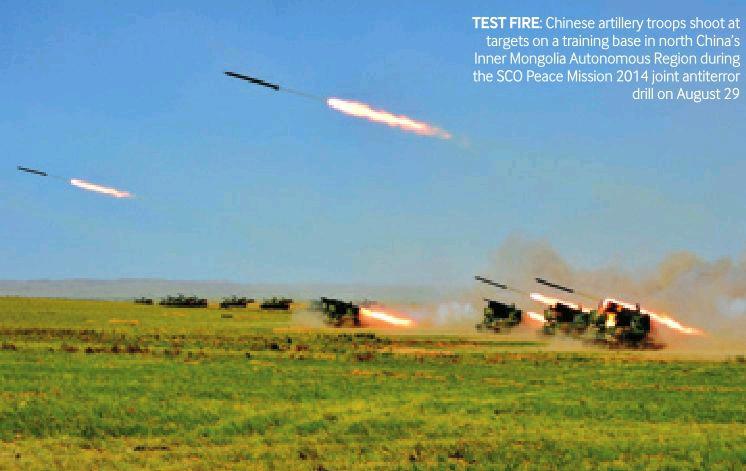Aiming Higher, Going Larger
2014-10-23ByBaiShi
By+Bai+Shi

In the last 13 years, the Shanghai Cooperation Organization (SCO) has been playing a constructive role in maintaining security and stability in Central Asia as well as promoting the economic development of its member states. From this year on, the SCO is expected to open its doors to new member states, demonstrating the growing vitality of the six-nation group of China, Russia, Kazakhstan, Kyrgyzstan, Tajikistan and Uzbekistan.
The 14th meeting of the Council of the Heads of State of the SCO was held in Dushanbe, capital of Tajikistan, on September 11 and 12. According to the Dushanbe Declaration and a communique signed and issued jointly by SCO leaders, regional security and economic cooperation are two major agenda topics for discussion at the summit. The leaders approved a series of documents on SCO expansion, implying the inclusion of new member states in the near future.
“The Dushanbe summit was significant for the SCOs development as it planned the organizations development strategy up to 2025,” said Sun Zhuangzhi, Secretary General of the Beijing-based Center for SCO Studies under the Chinese Academy of Social Sciences, in an interview with Xinhua News Agency.
Security challenges
Maintaining regional security has always been one of the most important tasks for the SCO member states since the organization was founded in 2001. At the very beginning, the SCO focused on fighting terrorism, extremism and separatism, as well as transnational crimes, such as drug smuggling. From the Chinese viewpoint, it allows the country to maintain the stability of its northwestern border areas by establishing a multilateral cooperation mechanism together with its Central Asian neighbors and Russia.
After years of efforts, the SCO has made achievements in fighting cross-border terrorism and crimes. The coordination and cooperation between the SCO member states have also been improved greatly, Sun said.
For example, the Peace Mission 2014 joint antiterror drills that concluded on August 29 reflect the fact that the security cooperation and mutual trust between SCO member states are further deepening, Sun said.
The five-day drills were held in north Chinas Inner Mongolia Autonomous Region, with the participation of more than 7,000 troops from China, Russia, Kazakhstan, Kyrgyzstan and Tajikistan and involving ground, air, special operations and airborne troops.
“The success of the drills demonstrates the unity of the SCO military forces, a strong capability to safeguard regional security and peace, and their resolution to fight against the ‘three evil forces of terrorism, separatism and extremism,” said Fang Fenghui, Chief of the General Staff of the Chinese Peoples Liberation Army.
Since their related mechanism was established in 2010, the Peace Mission joint antiterror drills have become a regular event among SCO member states. “It is a highly relevant way for China and other SCO member states to improve defense cooperation and counterterror coordination,” said Li Daguang, a professor of National Defense University PLA China.
The security situation in Central Asia is often influenced by many destabilizing factors, both conventional and unconventional.
“The Dushanbe summit gives a lot of attention to these new security challenges, such as cyber terrorism,” Sun noted.
Chinese President Xi Jinping proposed to enhance cooperation in fighting new security challenges at the summit. “The SCO member states should focus on combating religious extremism and Internet terrorism,”Xi said in his speech. “The SCO members should launch consultation on an antiextremism convention and initiate studies on a mechanism for actions against Internet terrorism.”
Sun said that Xis proposal reflects that information security has become a focus that deserves more attention.
Additionally, the situation in Afghanistan, an observer state in the SCO, is a concern for the organizations member states. Afghan President Hamid Karzai also attended the Dushanbe summit. SCO leaders reiterated support for political reconciliation and peaceful reconstruction led and owned by the Afghan people in the Dushanbe Declaration. They also stressed that Afghanistans independence, sovereignty and territorial integrity should be respected.
yu Jianhua, a researcher of international relations with the Shanghai Academy of Social Sciences, said that the Afghan issue is unavoidable for the SCO, as it makes efforts to improve its regional security environment.
Sun stressed that the SCO plays an important role in maintaining regional stability; however, it is not a military alliance. “It will neither put a spearhead to a third party nor interfere in the internal affairs of other countries,” he added.
Growth opportunities
Economic cooperation is the other driver for the SCOs development. Xi called on SCO countries to adhere to the goal of common progress and prosperity at the summit.
“Pushing the two wheels—cooperation in security and the economy—to run forward synchronously is a major agenda for the SCO,”said Pan Guang, Director of the Center of SCO Studies under the Shanghai Academy of Social Sciences.
At present, there are three international coop- eration frameworks in the Central Asian region. They are the multilateral economic cooperation mechanism led by the SCO, the Eurasian economic union initiated by Russia, and the Chinaproposed Silk Road Economic Belt.
Chinas vision of building an economic belt along the Silk Road, an ancient trade route that ran through nearly 30 countries in Central Asia, South Asia, West Asia, Europe and North Africa, has been met with a positive response from many countries, including SCO member states, since Xi put forward the proposal last year.
The proposal is a supplement to existing SCO economic cooperation regimes, reflecting Chinas innovative thinking on regional economic cooperation, Sun said.
“The proposal is not meant to establish a new mechanism or an integration organization,” Sun said. “The Central Asian region has complicated geographic features and large differences in economic strength between countries, as well as many challenges in economic development. However, these landlocked countries hope to achieve economic growth through international cooperation. In particular, they expect to improve traffic conditions with the help of foreign investment.”
According to him, based on the principle of mutual benefits, common development and opening up, China and Central Asian countries can usher in a new model of international economic cooperation. But Sun acknowledged that it requires long-term efforts to build the proposed economic belt.
An agreement on the facilitation of international road transport among SCO member states was also reached at the Dushanbe summit. The agreement is expected to build a traffic trunk from the Baltic Sea to the Western Pacific Ocean, from Central Asia to the Indian Ocean, which will promote economic cooperation and traffic linking between the SCO member states.
Promoting trade between member states is the primary task for SCO economic cooperation, and robust trade growth is proof of the remarkable achievements made thus far, said Liu Huaqin, a researcher with the Beijing-based Chinese Academy of International Trade and Economic Cooperation.
According to the World Trade Organizations International Trade Statistics 2012, trade between SCO member states had realized high-speed growth since 2003. Trade between all six member states of the SCO exceeded $4.9 trillion in 2012, increasing 4.49 times from 2003. The figure is higher than the average global trade growth, 2.39 times, in the same period.
In addition to economic growth, peoples quality of life remains a focus of SCO economic cooperation. In recent years, Chinese enterprises have contracted many major projects in Central Asian countries. These projects provide a win-win result for both investors and local people.
For example, a Chinese electricity equipment producer built an extra-high voltage electricity transmission and transformation network in Tajikistan in 2009. The project helped end north Tajikistans dependence on neighboring countries for power generation.
Despite positive attitudes toward economic cooperation, there are many difficulties for the SCO in implementing multilateral proposals due to differences in terms of economic strength and industrial structure between member states, Sun said.
New members
“The SCO is an open regional intergovernmental organization. As for membership enlargement, the SCO has taken a positive but prudent attitude,” Sun said.
The SCO has aimed to address security issues in border areas of the six member states from the beginning. As a young regional group, the SCO has been making efforts to improve its coordination and cooperation mechanism since its inception. Some countries, such as India, Pakistan and Iran, have expressed willingness to join the group for years.
Its working mechanism is a reason why the SCO has not added new member states. The SCO adheres to the principle of reaching a negotiated consensus among all member states. As long as there is one member state saying no, the SCO cannot carry out a proposal of membership expansion, Zhao Huirong, a researcher of Central Asian issues with the Chinese Academy of Social Sciences told Beijing Review.
However, from 2001 to now, the SCO has been expanding cooperation with more countries. It now has six members, five observers and three dialogue partners, proving the greater vitality of the group. The SCOs “Shanghai Spirit” of mutual trust, mutual benefit, equality, consultation, respect for cultural diversity and pursuit of common development is recognized and backed by all member states and applicant countries, Zhao said.
On September 12, Indian External Affairs Minister Sushma Swaraj formally submitted an application for Indias full membership to the SCO in Dushanbe.
According to Indo-Asian News Service, Indian External Affairs Ministry spokesman Syed Akbaruddin said, “It is our expectation that we will be able to contribute to the SCO in a better capacity once the SCO opens up its membership to other countries.”
“India sees the SCO as a forum where it can work regionally on several aspects, such as regional antiterror mechanisms,”Akbaruddin said.
India and Pakistan are expected to become new member states of the SCO next year, according to Pan.
